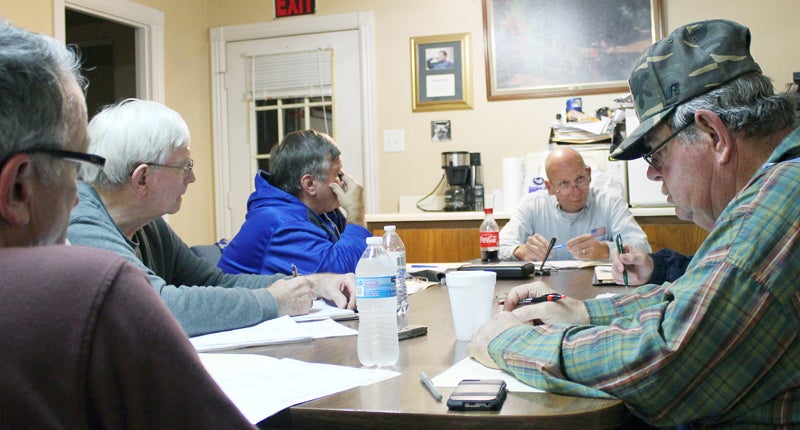Hustonville mayor breaks tie vote in favor of emergency services project bid
Published 7:13 am Thursday, December 7, 2017

- Photo by Abigail Whitehouse Hustonville City Council members discuss a project bid received by Franklin Price Inc., to complete the site preparation work for the new fire and emergency services building.
HUSTONVILLE — After three council members voted not to accept a bid for site preparation work for the new fire and emergency services building, Hustonville’s mayor broke the tie vote to accept the bid and move forward with the project.
The single bid the city received was from Franklin Price Inc. out of Liberty. The base bid, excluding the importation of top soil, was $29,512.
The bid proposal offers to furnish all labor, material and equipment necessary to complete the following site preparation services: installation of erosion control ($4,275), cut/fill the site to subgrade within six inches using all onsite material as fill ($22,658), installation of straw mat/erosion control blankets on entire site ($2,579) and optional importation of topsoil four inches deep on sloped areas ($9,356).
A representative of the company, Mike Sallee, was present during the Tuesday-night meeting to answer questions from council members.
“So y’all have experience doing this kind of work before?” Councilmember Jimmy Evans asked.
Sallee said he’s been in the business for more than 40 years, adding that Franklin Price’s main business in the last few years has been building gas stations for Kroger and Murphy’s USA.
“With that, there’s site grading in almost all of them as well,” Sallee said.
Councilmember Cecil Maddox asked if anyone would be checking the work to make sure it’s up-to-code.
“If you all want to get an independent, hire them just to check what we’re doing, that’s fine with us,” Sallee said. “We’re not certified to do reports on our own work, an independent person will probably need to do that.”
Councilmember Marc Spivey asked if the city did hire an independent person to inspect the work and it didn’t meet their standards, would Franklin Price come back and fix it.
“In our business, we basically assume that the on-site material is suitable for this fill, it just has to be re-compacted,” Sallee said. “…You need someone to check it as we go. Therefore if we have an area here that we see is soft, we’ll go ahead, while we’re here, and do it. We can fix it as we go. But once we’re to grade and it’s compacted and we sign off on it, then we’re pretty much done.”
As far as paying for the site work, Mayor David Peyton said the city could use the local match that was put into an account for construction for now.
“It’s a possibility we may have to replace that since this work is not being done at scale wages,” Peyton said. “We’re still looking at having to gravel later on.”
Peyton said almost all of the fill material on site now came from under the city streets during the sewer project.
“I think if we had bad material it would’ve shown up long before in our streets,” he said. “The material has been there over a year now.”
Sallee said the most important part of compaction tests is under the actual building pad.
“That’s where your weight is,” he said. “The parking lot, if it settles just a little bit, put a truckload of stone in in a year but your building pad, that’s where our most concern should be on the tightest compaction, underneath your building.”
In an effort to keep costs for the new fire and emergency services project down, the city decided last month to bid the initial site preparation work, which is not required to pay federal wages like the rest of the construction work is due to the grant funding involved.
Last month, city council members inquired about Lincoln County EMS’ commitment to keeping an ambulance in the new fire and EMS building as well as how much the city will need monetarily to operate and maintain the building and how much Lincoln County EMS should pay.
Lincoln EMS Director Ashley Powell said he hadn’t received figures on the overall operating costs as of last month but once he does, he can present those to the EMS board.
Josh Shuster of the architectural and engineering firm Brandstetter Carroll told council members he would get an estimated operating cost for the building but as of Tuesday this week, the city had not received those figures.
“Last month he was going to give us a price on what it was going to cost to maintain that every month and when I asked him, ‘oh I can find out in a week’s time.’ Has he called you?” Councilman Maddox asked Peyton. Peyton said he has not received a call with the figures.
Spivey said he doesn’t think the city should be paying $30,000 to proceed with construction without knowing first what Lincoln County EMS is willing to pay to house an ambulance in Hustonville.
“That’s what’s holding Lincoln County (EMS) up on giving us any kind of information, because we haven’t got that estimated cost,” said Councilman Alan Sims.
Peyton said Lincoln County EMS will have utility costs wherever they keep an ambulance.
“Their board submitted a letter of intent that was filed with this grant application,” Peyton said. “They’ve got the intent, that’s what helped us get the grant.”
Peyton said a new building with more efficient heating and cooling will be more cost-effective for Lincoln County EMS than using an existing, older building somewhere else.
Spivey suggested the city hold off on accepting the bid until they have the figures to give Lincoln County EMS and a commitment to pay a certain amount each month.
“There’s no way that EMS could come over to the west side of the county, buy property, put up their own building, their own utilities, their own insurance and operate any cheaper than they can with us in this way. No way,” Peyton said.
Councilman Jimmy Lane made a motion to accept the bid from Franklin Price Inc., with a second from Councilman Dudley Hardin.
Evans, Maddox and Spivey voted no, leaving Peyton to break the tie vote in favor of the motion.
Peyton said he would get in touch with Shuster to get the operating costs for the new building and will possibly call a special meeting next week, if needed.
In other business:
• Santa Claus will be at Hustonville City Hall on Dec. 16 from 1 to 3 p.m.





